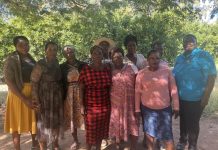
Africa-Press – Zambia. 1. A lot of people have questioned why President Hakainde Hichilema decided to abscond from the 44th Ordinary Heads of State Summit for the Southern African Development Community (SADC) that was held in Harare, Zimbabwe yesterday? This was especially strange given the backdrop that President Hichilema is the Chairman of the SADC Organ on Politics, Security and Defense, which is the most consequential sub-committee of SADC.
2. Well, from my standpoint, the reason was quite simple. The President was embarrassed. He was too ashamed to look his colleagues in the eye during the summit. Ashamed of what he recently did a few days ago which caused his fellow Heads of State in the region to unite and unanimously condemn his actions. So at the end of the day, Mr. Hichilema was faced with two options; attend the summit and endure the walk of shame in front of his peers, or abscond and become a laughing-stock among his peers. He was really stuck between a rock and a hard place. Ultimately, he chose his poison and decided to conspicuously abscond from the summit. The first time in SADC’s 44 year history that it’s Chairman for it’s most coverted portfolio of Politics, Security and Defense, has absconded from an ordinary summit.
3. But what is Sean Tembo talking about? Some might begin to ask at this point. Well, am talking about President Hakainde Hichilema’s ill-advised decision to close all three of the Zambia – DRC borders and bring regional trade to a sudden halt. Our country rarely makes international news these days, but last week it did. We were trending in the New York Times, Bloomberg, Financial Times, Reuters and CNN. And the narrative was quite uniform in all these international news outlets; that Zambia’s decision to shutdown all it’s three borders with DRC was radical and unwarranted.
4. But how did all this come about? You may ask. Well, it all started when the DRC Minister of Foreign Trade, Hon. Julien Paluku Kahongya issued a decree temporarily restricting the importation of certain products into DRC from Zambia, which included beer, soft drinks, tiles and specific earthenware products. According to the decree, this was based on the findings of a study that had recently been concluded by the DRC Ministry of Economy which found that these products from Zambia were bringing “imported inflation”.
5. The DRC Minister of Foreign Trade then proceeded to invoke article 6, paragraph 2 of the Bilateral Agreement between Zambia and the DRC which was signed on 6th August 2015, which provides that “an importing country can take anti-dumping measures which includes restricting the importation of certain products, if it finds that such products are being subsidized or are being sold at very low prices as to cause injury to the manufacturing industry of the importing country”. That is how Zambia’s exports to the DRC of beer, soft drinks, tiles and related earthenware products was halted.
6. However, in a typical fashion of incompetence, President Hakainde Hichilema decided to close all Zambia’s three commercial borders with DRC, in apparent retaliation to the DRC ban of specific Zambian imports. His lame excuse was that the borders were caused because of rioting that was taking place in the respective border towns. However, this excuse was lame because there was no evidence whatsoever of any riots. Additionally, this retaliatory action was undertaken without any declaration of a trade dispute with DRC, which put Zambia in conflict with World Trade Organization (WTO)rules on international trade, and therefore at risk of sanctions.
7. But more importantly, President Hakainde Hichilema’s radical decision to shutdown all of Zambia’s borders with DRC unnerved all the leaders in the SADC region for two main reasons. Firstly, Zambia is used as a transit corridor for trade between the southern part of Africa, and the east and central parts of Africa, meaning that the sudden closure of all borders with DRC would not only punish DRC, but would punish all countries in the region. Secondly, a decision to shutdown borders because of an apparent trade dispute is wanton and unprecedented. It has never happened in the region before. The most that a country can do is impose non-tariff barriers such as high toll fees for foreign vehicles. But not shutting down borders.
8. That is not to say there have been no trade disputes among SADC countries. Trade disputes have always been there. For instance, South Africa and Botswana are big trade partners, but they often quarrel on the issue of importation of fruits and vegetables. Often times, Botswana would ban the importation of fruits and vegetables from South Africa in order to protect the local industry. Similarly, Zimbabwe and South Africa are big trade partners, but they often quarrel on the issue of immigration. Oftentimes, undocumented Zimbabweans living in South Africa are deported en masse. But never has any of these bilateral trade disputes resulted in shutting down of borders between countries.
9. And then you have Zambia’s Hakainde Hichilema, who is not just an ordinary member of SADC, but it’s Chairman for the Organ on Politics, Security and Defense. The person who is responsible for resolving disputes among SADC countries, is in fact in the forefront creating disputes. How could he surely go and meet his colleagues in Harare and look them in the eye, after such wanton behavior and clearly poor judgement of shutting down the borders? Of course he could not. He had to stay home and wallow in the shame of his poor decisions. But even that soon proved futile. The burden of shame was too much to keep chewing on, alone at Community House. So while his colleagues were meeting in Harare at the 44th Ordinary SADC Heads of State Summit, our Head of State was getting some fresh air in Chiengi.
10. But is there anything that Zambia can do regarding the DRC’s decision to ban the importation of our beer, soft drinks, tiles and related earthenware products? As a matter of fact, yes. The first step is to formally declare a trade dispute using the established diplomatic channels. And if the matter is not amicably resolved, we can invoke article 9 of the Bilateral Agreement and take the dispute to arbitration. Am quite confident that the arbitration would go in our favor because the DRC actions in this matter are actually contradictory. You see, according to the decree by their Foreign Trade Minister; Hon. Julien Paluku Kahongya, he says that a study by their Ministry of Economy found that the banned Zambian products were bringing in “imported inflation”, meaning that the prices kept going up everytime they imported. However, when you look at article 6, paragraph 2 of the Bilateral Agreement between Zambia and the DRC which was signed on 6th August 2015, which DRC relied upon for it’s ban of certain Zambian products, it provides that “an importing country can take anti-dumping measures which includes restricting the importation of certain products, if it finds that such products are being subsidized or are being sold at very low prices as to cause injury to the manufacturing industry of the importing country”. The question is; was Zambian beer being sold at very high prices so as to bring imported inflation to DRC, or it was sold at very low prices to constitute dumping as per WTO definition? It surely can’t be both. Those are the issues which our Government was supposed to be pursuing. If we had a competent Government.
///END
SET 18.08.2024
For More News And Analysis About Zambia Follow Africa-Press






